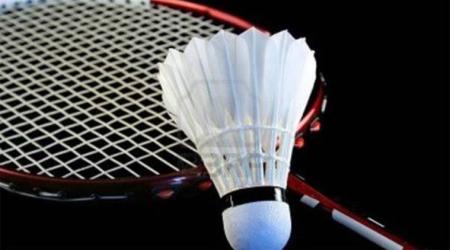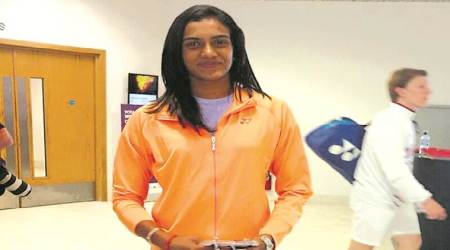 PV Sindhu (File Photo)
PV Sindhu (File Photo)
There are pretty losses like at Rio: PV Sindhu, valiant during some high-quality and high-paced stroking that took your breath away. Like climbing Everest, and heroically failing at the very end. And then there are ugly victories like her 19-21, 23-21, 21-17 epic that will merely be logged on the records against Cheung Ngan Yi of Hong Kong at the Glasgow World Championships, with no medal assured yet.
Both add to her legend as a champion athlete, though this week’s tale remains to be scripted. Thursday was as ugly and wearying as trudging the rolling hills around the country’s motorways, the destination blurred on the horizon — sliding down a slippery slope, climbing back up the next moment and each step an almighty pain. The 87-minute plodding, where giving up would’ve easily ended all the agony she felt each moment, was the tournament’s longest match yet.
The Olympic medal was grand and ornate and a shining silver in the end; Sindhu’s World Championship pre-quarters on Thursday was the unglamorous metal shard off the foundry, albeit the toughest steel, forged in the hottest fire.
In the course of the match, the 22-year-old Indian was brought down on all fours, she clutched her hips and doubled over in pain, barely stood up after being thrown off her defence in vain, but finally scraped the barrel and drew out power from seemingly nowhere. It wasn’t about trying hard, it was about winning in the end.
There were moments of extreme nervousness. Sindhu is a raw beast on court – sure, she smashes like a cannon-ball exuding Wonder Woman’s might, but she can also look like in utter despair, powerless and clueless when shots don’t go her way. Cheung pushed her into every dark, dirty crevice of the maze, where she was forced to dig in her heels and at times scramble on her nails.
Tough nut to crack
Cheung has a certified smash that can finish it all, and she has a diving defence that doesn’t allow the opponent’s attack to end. She is relentless and in front of her stood a leaden-footed Sindhu in the first game, unable to retrieve everything and struggling to connect. Cheung likes to make opponents run around, and it’s what kept the Indian chasing her lead always.
9-11 down in the opener might not have put Sindhu under pressure, but it was making the climb seem steeper at every step. Cheung was maxing her smash, even as Sindhu failed to find rhythm on her strokes or string some continuous points. At 17-18, it seemed like slipping away. And though she was warming up to the long rallies, losing the first game with a lot of time spent on all fours had chipped at her confidence in a big way.
It didn’t help that she was barely lunging at the net, and smashing zilch, her resistance limping pitifully away. Cheung took the last three points and sent Sindhu into a proper scare. She had even darted to tap at the net once, while the shuttle flew past her ear and head. “I didn’t know what’s happening, I knew I needed to change something,” she would later say. Except there was nothing but good ol’ outlasting in rallies to be done.
It started in the second, as Sindhu began to retrieve the wide shuttles on her backhand and front corners, though the strength in the kills wasn’t exactly apex. Still, she would use her underrated drops and tosses – and it was her unforgiving chasing down of every shuttle that really hurt the Hong Kong girl, who must’ve been warned of her booming attack but not so much of the proud defence.
Tooth and nail
Cheung would still scramble to 9-9 and head into the break 11-10. At 13-16 down in the second, there was nothing in Sindhu’s body language that inspired any confidence as she winced and grimaced at every point going the other way. But goaded by coaches Mulyo Handoyo and P Gopichand, who urged her to keep the shuttle in court, no matter what, Sindhu would grit her way out of exhaustion and pain.
The first long rally was pure variety in strokes – dogged at the net, pushing to the back. But it was in the subsequent two long rallies nearing the end of Game 2 that Sindhu brought on the next gear. It’s not her legs that spin like wheels when she accelerates. It’s her arms that begin whirring away. She’s not the most languid shoulder-upwards, but one key Gopichand-training technique has been to increase the hand-speed to dial SOS.
She would increase the rate of strokes and push pace on her overhead shots as last-gasp, and that would finally begin to pierce holes in Cheung’s own acrobatic defence. Lasting over-30 shots in three straight rallies gave Sindhu the hardest-earned second game of her life, even though Cheung buzzed like a fly refusing to go away. “It was important to keep going because she was also tiring. I didn’t lose hope after the first game, though I didn’t have the confidence after losing the first game. It wasn’t easy to finish because she kept coming back. I was very nervous,” Sindhu would say. “The 21st point was important,” she recalled. It had been the longest rally, really high tosses that can be exacting even on the long arms, when finally Cheung after throwing everything at the Indian, sailed one wide.
Sindhu’s been in such battles in the lead-up year to Rio, but never with the spotlight and pressure burning so bright on her. At Glasgow, she was scripting a massive escape.
The third game ought to have been easier, after she’d won the psychological battle. But after leading 11-4, Cheung and her smashes resurfaced to level at 12-all. “Thoughts of the first game started coming back. It was important to be ready and alert at all times,” she said. “There was so much pace on the rallies, I had to keep going.” Cheung would get a sniff at 15-14 before Sindhu had had enough. She pulled away one long stride at a time, and won in the Championship’s longest game. Life’s not easy for a silver medallist from Rio. There’s the equally tall and strong Sun Yu of China the next day. “It’s the big stage,” she added.

